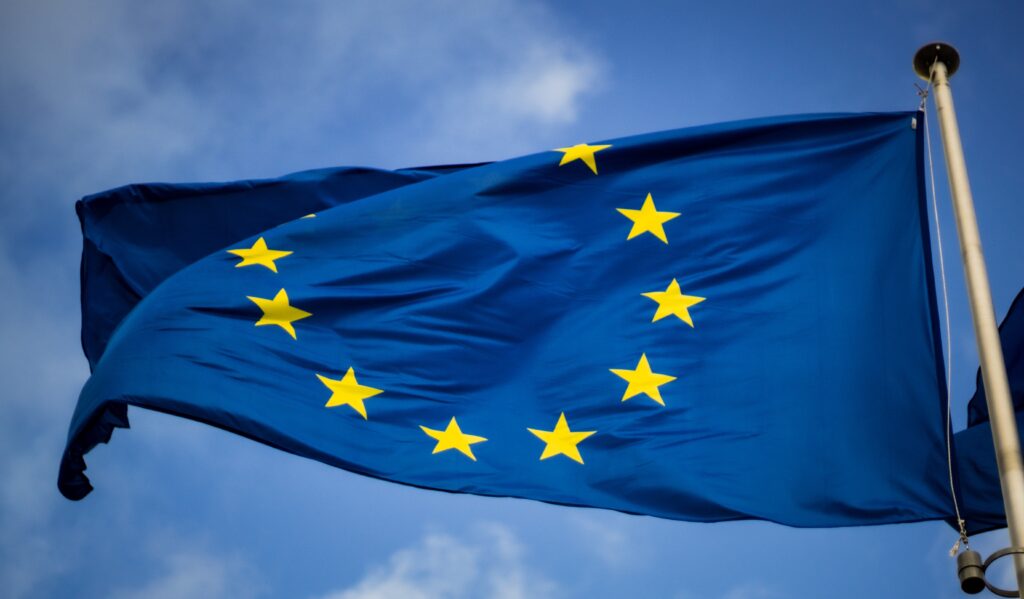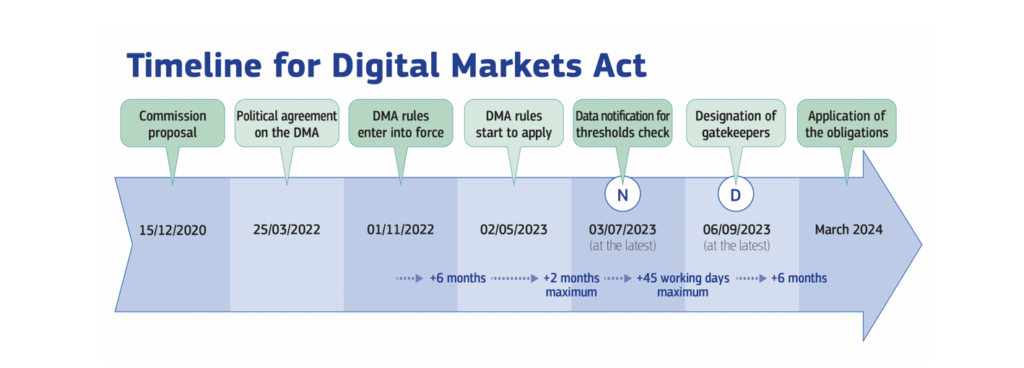The European digital market is to become fairer and more competitive as the Digital Markets Act (DMA) comes into force

DMA is a part of the European regulatory program “A Europe Fit For the Digital Age”. Source: unsplash.com
The groundbreaking legislation from the European Parliament will change how tech platforms serve the EU’s 400 million internet users. By creating a single set of rules applicable across the EU, DMA aims to ensure a level playing field for digital companies of all scales.
Along with other parts of the European regulatory program “A Europe Fit For the Digital Age”, the new law will significantly impact the digital regulatory landscape in the coming years. Moreover, DMA will directly influence the platform service customers and smaller tech providers.
DMA Timeline
After its initial proposal in December 2020, the landmark European Digital Markets Act (DMA) got an agreement from the European Parliament and the Council in March 2022. On November 1, it officially entered into force.
From now on, the implementation phase begins. First, the EU must decide which companies should be classified as “gatekeepers” subject to stricter market rules. Setting regulatory thresholds should take about six months, with the deadline on 2 May 2023.
Once regulators establish clear quantitative criteria of which digital companies belong to the so-called gatekeepers, they’ll have two months to report their core platform services to the European Commission.
Next, the Commission will assess each company’s core business impact on the internal market and determine whether it should count as a gatekeeper. The designation process will end on 6 September 2023.
Finally, the selected gatekeepers will have six months to comply with DMA requirements, at the latest by 6 March 2024.

What changes for the big techs?
Those companies concerned will have to comply with strict requirements, which should prevent market monopoly or unfair privileges. Thus, the likes of Apple, Google, Meta, Amazon or Microsoft will have to:
- not rank their own services and products higher than similar third-party services or products
- give users the possibility to uninstall any pre-installed software or app
- allow third parties to interoperate with their services (exchange messages or files across messaging apps)
- provide app developers and third-party service providers with access to device functionalities such as NFC, secure elements and processors, authentication mechanisms and related software
- allow business users to access the customer data they generate in the gatekeeper’s platform to promote their offers and contracts outside the big platforms
- allow users to easily acquire content, subscriptions, features or apps from other app stores
- not process users’ data combined from different sources for targeted advertising unless they explicitly grant consent
- report to the Commission on all digital-sector-related and data-related M&A transactions
Companies that do not comply with the legal requirements could face fines of up to 10% of their worldwide turnover in the preceding financial year (up to 20% if repeated).
The adopted code of conduct for the large market players marks a big shift in competition regulation. The law will give the regulator greater leverage in market oversight. Compared to the old approach of investigations based on anti-competitive behaviour, DMA will be proactive and require less bureaucracy to fine the tech giants for self-preferencing.
DMA is a piece of the bigger puzzle
Undoubtedly a landmark initiative, the Digital Markets Act is only one part of the larger framework known as ‘A Europe Fit For the Digital Age’. The program includes other legislative proposals like the Artificial Intelligence Act, the Data Governance Act and the Digital Operational Resilience Act (DORA).
Besides, DMA will work alongside the Digital Services Act (DSA) within the ‘Digital Services Package’. While DMA is aimed at a few large-scale providers, DSA covers a much broader scope. Digital services include various online solutions, from simple websites to internet infrastructure services and online platforms. Therefore, rules specified in the DSA would apply to online marketplaces, social networks, content-sharing platforms, app stores, and online travel and accommodation platforms, among others.
The whole bunch of new regulations aim to create a safer digital space, protect fundamental customer rights, establish a level playing field for online businesses, foster innovation, growth and competitiveness, as well as start an open policy dialogue on various aspects of the digital economy.
Taking into account a lack of the legal clarity in other parts of the world, European legislation regarding the digital markets might trigger global changes in legal treatment of innovative services and their providers. Introducing the strict rules of “dos and don’ts” will completely reshape the Internet landscape, making it more open and interoperable.
Therefore, all related organisations, whether big or small, should keep an eye on the progress and speed of legal changes to prevent any surprises in the coming years.
Who are the Gatekeepers?
Gatekeeper platforms are digital platforms with a systemic role in the internal market that function as bottlenecks between businesses and consumers for important digital services.
Although the tech giants belonging to Big Five are obvious candidates for the market influence scrutiny, suggestions are the ultimate list of the gatekeeper companies would include about 15-20 household names. So, which firms will pass the EU’s thresholds?
Here are the main criteria for a business to be considered a gatekeeper:
- A company must operate one or more of the so-called “core platform services”. These include: app stores, online search engines, social networking, certain messaging services, video sharing platforms, virtual assistants, web browsers, cloud computing, operating systems, online marketplaces, and advertising services.
- It should provide the above-mentioned services in at least three EU Member States.
- Platforms must have a yearly EU annual turnover above €7.5 billion, a market capitalisation over €75 billion, at least 45 million active monthly end-users and 10.000 yearly business users in the EU.
- Its market position is durable and entrenched (the company has met the quantitative criteria for the last three years). The Gatekeeper status should, thus, be re-evaluated every 3 years.

Source: adyen.com
DMA impact on platform users
Small and middle-sized businesses operating on gatekeeper platforms will now enjoy a higher level of equality and transparency. Naturally, the competitors would not immediately overthrow the market dominance of the established leaders. However, less exclusivity and departure from monopoly will give business users more opportunities and better offers.
With time, a fairer and contestable market will stimulate innovations, convenience and greater choices both for the end-users and corporate intermediaries. Businesses will interact with their target audience seamlessly, with access to customer data they generate in the gatekeeper’s platform. They would have greater insights helping to promote their offers and contracts outside the big platforms.
In addition, the DMA will greatly improve the experience for retail consumers using gatekeeper platforms. They will also have more freedom of choice, see improved protection of their data and enjoy the benefits of interoperability and data portability. Imagine the direct exchange of messages across different messenger services, downloading apps of your liking to the smartphone with no regard to its operating system, or the ability to switch to a less costly service for your device.
Who will enforce DMA compliance and how?
The European Commission is the main regulator and controller of DMA compliance, with national competition authorities having a supporting role. It will initiate proceedings, take infringement decisions and take other measures to enforce the DMA provisions.
To ensure gatekeeper rules keep up with the fast-changing pace of digital markets, the Commission will carry out research and investigations and dynamically update the obligations for gatekeepers if needed.
Violations of DMA will incur fines ranging from 5% of the daily turnover to 20% of the annual turnover, depending on the severity of the case. Besides, the regulator will design remedies to tackle systematic infringements of DMA. In worst cases, when fines wouldn’t work, the Commission could resort to non-financial remedies including behavioural and structural remedies, e.g. the divestiture of (parts of) a business.
SEE ALSO:
Amazon hit with multi-million GDPR fine
Competition between Big Tech and banks can boost borrowers’ privacy – BIS
Money20/20 – key highlights from Europe’s biggest fintech conference









